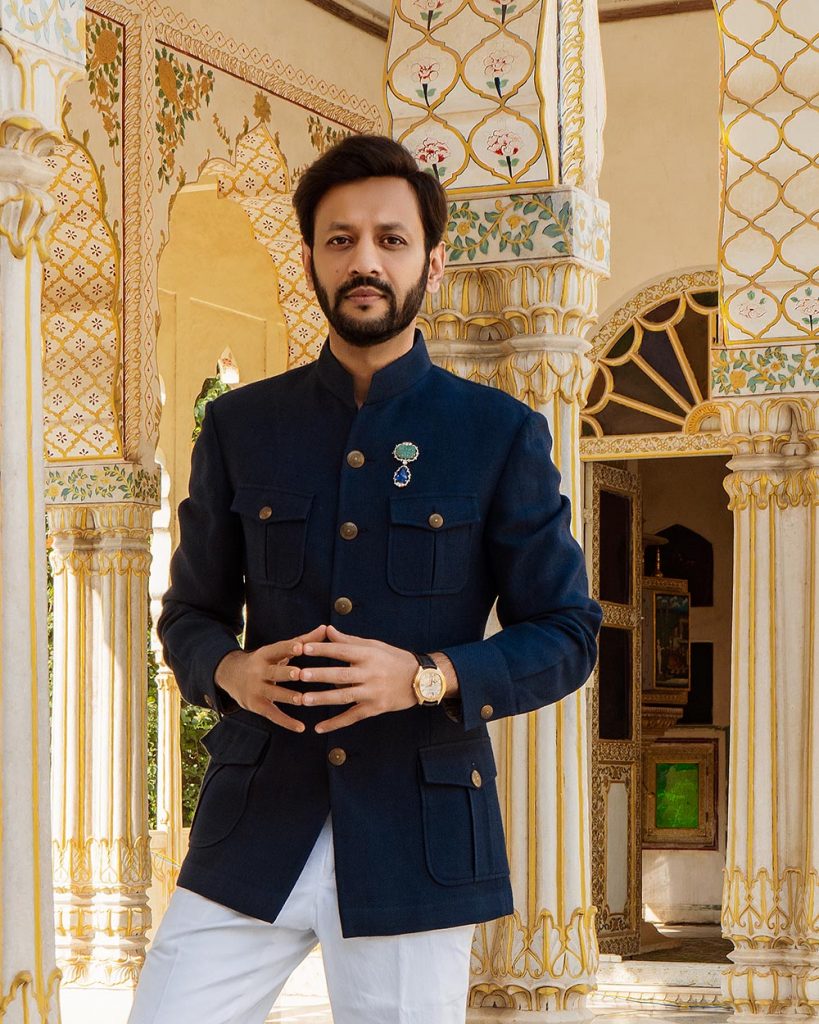Abhishek Raniwala, Founder of Raniwala 1881, is the torchbearer of his family legacy. A top-end jeweller, who has his eyes firmly set on the future, Abhishek has given a new spin to the traditional jadau jewellery by introducing ethno-contemporary collections in the bridal segment as well as a scaled-down prêt version of jadau, which has been the main driver of online sales for the brand during the pandemic.

We would like to know more about your family history … Your early experiences that made you realise that you were cut out for this profession.
Rooted in Beawar, the legacy of Raniwala began as a collector of fine jewellery and crafts of Rajasthan. My great-great grandfather Rai Bahadur Champalal was an aristocrat and a connoisseur of gemstones from an early age, with an astute eye for aesthetic and design in jewellery. I was inspired by his life, and his ambition to keep our family name alive.
How and when did you join your family business?
I remember as a child I was always intrigued by the beauty of jewellery.
A sandook (treasure box) filled with lavish and opulent jewellery in our haveli caught my eye. I was bedazzled by it and knew that one day I would be part of this world. In 2007, I joined my family business.
What defines your company?
We believe ourselves to be patrons and purveyors of the heritage jadau craft but our inimitable spin is to approach it through a modern lens. We try to preserve the alluring craft of jadau by introducing various design languages while keeping the rich heritage alive.
How has the brand been impacted by the pandemic? What changes have you made since then?
The pandemic has affected businesses, brands and people alike. Our sales also took a hit. We’re in a business of not just selling a product, but an experience. And with the travel restrictions imposed, that experience was taken away from our clients. But we are doing everything in our capacity to make up for it. We are storytellers, so we brought our stories and experiences online. The digital space is very powerful and it built a bridge between our clients and our brand.
Is online becoming more important than in-store retail? If yes, how is it faring? What are the price points that are popular online?
Online retailing was always a key component of our sales. But ever since the pandemic, it has become a front-runner. Introducing one’s brand to the digital world has become a necessity. Our in-store clients look for an experience, while our digital clients look for a story. The price points for the online platform ranges from Rs.30,000 to Rs.1,50,000.
What are the current buying trends?
Today, anything that’s trendy and chic sells. In the jewellery world, coloured stones like morganites, emeralds and rubies are staples. But along with this, customers are also looking for pieces that would complement their personalities. Traditional designs are also favoured as everyone wants to own a part of the traditional legacy.
What is your outlook for the second half of 2021?
I am positive about our future. With the majority of our population getting vaccinated and the markets gradually opening up, things will normalise in the months to come. The transition from intimate weddings at home to the big fat weddings that might happen if things keep getting better at the same pace. We’re already working on a new campaign to introduce our collection that’s going to be grander.
Where do you see Raniwala 1881 in the next decade? Any plans of expansion?
We see ourselves becoming synonymous with exquisitely crafted polki jewellery in the next decade. We want to be more design-centric. We also have plans of opening up retail stores in different parts of the country and tap new clients through our e-commerce portal.
Tell us about the birth of the Ready To Wear collection – it was a brilliant idea to scale down the ancient kundan-meena art to the prêt wear line. How is it faring?
The Ready To Wear (RTW) Collection stemmed from the vision of making polki and kundan accessible to everyone. We didn’t want to limit this exquisite craft to just bridal jewellery.
Prêt wear is an integral part of our industry’s supply chain. We have great ambition for our RTW line and are coming up with two more collections. The previous theme was inspired from Art-Deco motifs in a contemporary way. This time, we’re introducing a baroque line that the Gen Z and Millenials will adore.
Your views on exemption of kundan-polki meena jewellery from mandatory hallmarking…
The art of age-old handicrafts like Kundan, Meenakari, Polki and Jadau is immensely intricate. It takes long dedicated hours of rigorous hand-crafting these pieces which makes them one of a kind. Putting a stamp of mandatory hallmark wouldn’t do justice to a craft that incorporates three different gold karats, which in itself is noteworthy.
I think with our industry transforming into a systematic establishment and its transition into the digitised world with a better system in terms of logistics and macroeconomics, will augur well for the jewellery industry’s evolution in the future. The major acceleration in the jewellery industry is still due and that would happen when the front-end and the back-end, i.e. the technology and the karigars, align together to adapt to the economics of the supply chain.
Do you export jewellery? If so, which are your markets? And the trends in terms of design prevalent there?
Yes, we mainly export to the USA. Since we make polki-centric jewellery, our audience is small, but niche. We’re looking towards expanding and we hope to make this craft accessible to the world.




